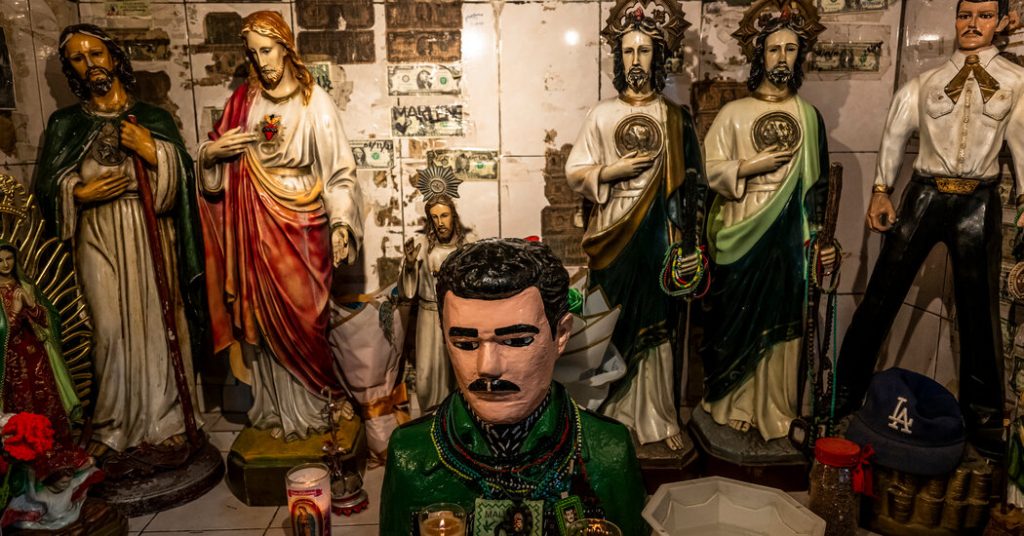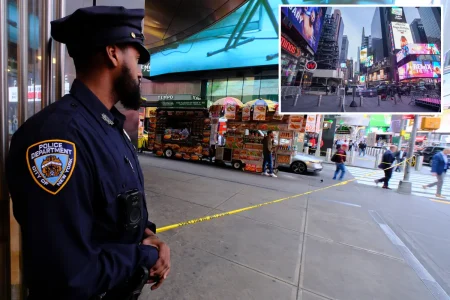Here’s a streamlined, conversational retelling of this dense material, weaving all the big ideas together.
—
Imagine being caught in a web so tangled that every move has unintended repercussions. That’s pretty much the scenario President Trump’s recent executive order on Mexican cartels lays out—not just for the cartels, but for businesses, banks, and even everyday people on both sides of the U.S.-Mexico border.
The order labels Mexican drug cartels and similar criminal networks as foreign terrorist organizations, a stark move designed to maximize pressure on Mexico to curb its dangerous drug trade. On paper, it sounds firm and resolute—using the designation to impose sanctions, restrict travel, and even potentially authorize military action. But peel back the layers, and things get messier, fast.
### A Blurred Line Between Crime and Commerce
Cartels aren’t just smuggling drugs and people anymore; they’ve embedded themselves into legitimate industries that are deeply tied to the Mexican—and, by extension, American—economy. Think of avocados, major tourism hubs, and even manufacturing operations. These aren’t minor sidelines for the cartels; they’re systems cleverly entwined with clean businesses, which makes it nearly impossible to trace or untangle.
Here’s the kicker: Mexico is the United States’ largest goods trade partner. Many American companies rely on Mexican suppliers or have factories there. Samantha Sultoon, who has advised on sanctions during both the Trump and Biden administrations, explained why this foreign terrorist designation is such a divisive gambit. This move didn’t come out of thin air. It’s been debated for years across party lines, but previous administrations ultimately backed off. Why? The potential fallout on U.S.-Mexico trade, finance, and diplomatic relationships seemed too big a risk. Trump’s administration clearly sees things differently.
### The Ripple Effect on Businesses
If the designation goes into full swing, its consequences might not stop at cartels. U.S. companies operating in or with Mexico could face sanctions, fines, or even criminal charges—especially if they unknowingly engage with cartel-controlled entities. Pablo Zárate, a senior executive at FTI Consulting, noted that even extortion payments made under coercion could be classified as providing “material support” to terrorism. This means that businesses, particularly in risk-averse sectors like finance, might just decide it’s safer to pull out of Mexico altogether.
Imagine a U.S. bank trying to process payments to a factory in Mexico that produces components for American goods. If there’s even a whiff of cartel influence tied to that factory, whether legitimate or rumored, the bank might hesitate. And if the factory is in a high-risk industry—take avocados, for example, where cartel infiltration has dramatically expanded—many banks might simply decide it’s not worth the headache. “We don’t want to be anywhere close to those who are considered terrorists,” is the rationale Fabian Teichmann, a Swiss lawyer specializing in terrorist financing, anticipates. Ultimately, businesses and banks might overcorrect, avoiding entire parts of the Mexican economy for fear of stumbling into a legal minefield.
This isn’t just banks. Even tech-forward payment processors like Venmo and PayPal could be affected. Financial institutions may start blocking transactions to Mexico altogether, which could devastate one critical economic lifeline: remittances. In 2023 alone, the Mexican economy received a staggering $63.3 billion through remittances, making up about 5% of its GDP. If families in the U.S. can no longer send money home to Mexico, we’re talking about economic shockwaves across communities.
### The Complexities of Labeling Terrorism
Perhaps the most worrying part of this designation is how broadly it could apply. Cartels use legal businesses as fronts for money laundering, but untangling these networks is no small feat. Many employees at a resort or an avocado packing plant, for instance, could technically be on cartel-controlled payrolls and not even know it. This ambiguity places companies in nearly impossible positions. Any inadvertent connection to a cartel might place them under U.S. law enforcement scrutiny.
And that historical precedent doesn’t exactly inspire confidence. Take Chiquita Brands, for example. Back in 2024, the multinational fruit producer was found liable for making payments to a Colombian paramilitary group designated as terrorists. While the company claimed it was extorted to protect its in-country employees, others argued the payments actively benefited the group. This chilling case looms as a cautionary tale for other corporations caught in similar tightropes, particularly as cartels deepen their reach into Mexico’s legal economy.
It gets even more complex when you consider how loosely this might apply to individuals. Remittances might sound flashy in discussions about cartels, but it’s common for those working in the U.S.—be they agricultural workers in Texas or factory operators in California—to send money back to family members in Mexico. But what happens if that money inadvertently lands in the hands of someone tied to organized crime? Are these laborers, who might barely be making minimum wage, suddenly at risk of being complicit?
### Shadows and Sovereignty
One unintended consequence of such a sweeping designation could be to drive parts of Mexico’s economy further underground. Cash transactions, which are notoriously harder to trace, might become the norm, which only strengthens cartels’ financial opacity. Fabian Teichmann warns about this shift to “underground banking systems,” which could ultimately make solving the cartel problem even harder.
Then there’s the matter of international relations. The designation doesn’t just enable sanctions and financial penalties; theoretically, it paves the way for possible direct U.S. military intervention inside Mexican borders—a scenario with uncomfortable echoes of U.S. operations in Afghanistan and Syria. But Mexico isn’t Afghanistan or Syria. For one, the U.S.-Mexico relationship is built on decades of cooperation, particularly around counter-cartel strategy. Any unilateral action by the U.S., such as deploying troops without Mexican consent, risks obliterating that collaboration.
As Craig Deare, a former U.S. military attaché, puts it, “Unilateral action would be catastrophic.” We’re not talking minor disruptions here—this is about upending three decades of bipartisan work on U.S.-Mexico defense. And if you thought cooperation was fraught now, just wait until Mexico cuts all defense ties, he warns.
### A Mexican Rebuttal
Predictably, Mexican leadership isn’t taking this lightly. President Claudia Sheinbaum wasted no time responding to Trump’s order, using her daily press conference to issue a firm warning: “We will always defend our sovereignty.” She emphasized a desire to combat the cartels—not through unilateral actions but joint, collaborative efforts. To her, fighting the drug trade isn’t the issue; it’s the undermining of Mexico’s sovereignty that’s unacceptable. And she assured her citizens that the Mexican government would prioritize the country’s autonomy above all else.
### A Crossroads Moment
So, where does this all leave us? Trump’s bold designation certainly aims to escalate the fight against cartels, but its ripple effects could make it more of a high-stakes gamble than a silver bullet. From crippling financial uncertainty for U.S. businesses and Mexican suppliers to potentially dismantling decades of diplomatic progress, the fallout could reshape U.S.-Mexico relations in seismic—and complicated—ways.
While everyone agrees the cartels are a major problem, the real question isn’t whether to fight them, but how. Do you risk economic pain on both sides of the border, not to mention potential international backlash, to wage this fight? Or is there room for smarter, more collaborative solutions that don’t leave an already fragile situation even more fractured?
That’s the puzzle staring both nations in the face—a tangle of economic, legal, and human stakes that no label, no matter how dramatic, can untie cleanly. And as the two countries move forward, the stakes of each decision couldn’t be higher.










